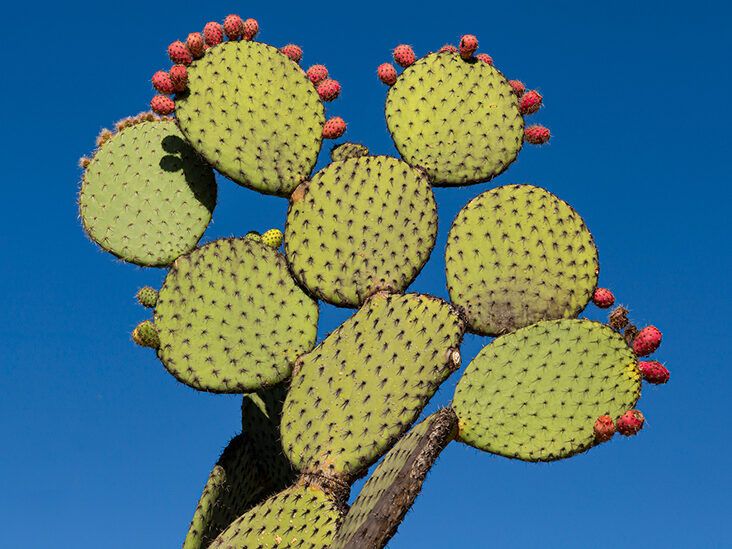Cactus Nutrition Information fruits are an excellent source of vitamin C, which boosts the immune system. They also contain betalain and potassium, which are beneficial for digestion.
Additionally, cacti have been used for centuries in medical treatments for chronic diseases such as obesity, cardiovascular diseases, diabetes, and gastric ulcers. Cactus pads, or nopales, are low in carbs and high in potassium. Cacti have numerous health benefits and are a nutritious addition to your diet.

Credit: www.medicalnewstoday.com
2. Types Of Cacti
Various types of cacti thrive in different environments around the world. Each type of cactus has its own unique nutritional and dietary benefits. Understanding the types of cacti can help you make informed decisions about incorporating them into your diet. Let’s take a closer look at the different types of cacti.
2.1 Desert Cacti
Desert cacti, such as the prickly pear and saguaro cactus, are well-adapted to arid environments. These cacti often store water in their fleshy stems, making them resilient in harsh conditions. The pads and fruits of desert cacti are known for their rich nutritional profile, containing essential vitamins and minerals, including vitamin C, magnesium, and antioxidants that are beneficial for overall health. Their low-calorie and high-fiber content also makes them an excellent addition to a balanced diet.
2.2 Jungle Cacti
Jungle cacti, or epiphytic cacti, are native to tropical rainforests and typically grow on trees or rocks instead of in desert soil. These cacti, including the famous Christmas cactus, may not be as well-known for their nutritional value, but they, too, offer health benefits. Their vibrant flowers are visually appealing and rich in nectar and edible. The flowers are a good source of natural sugars and can be a delicious addition to a balanced diet when consumed in moderation.
2.3 Epiphytic Cacti
Epiphytic cacti, such as the orchid cactus, are unique in their ability to adapt to the moist conditions of jungle environments. While these cacti may not be typically consumed for their nutritional value, their unique growing habits make them an exciting addition to any cactus collection. Their aerial roots allow them to absorb moisture from the air, and they often produce stunning, colorful flowers that bring a touch of natural beauty to any indoor space.

Credit: www.amazon.com
4. Vitamins And Minerals
Cactus Nutrition Information: Cactus fruits are a rich source of vitamin C, which boosts the immune system. Their betalain and potassium content aid digestion. Cactus holds potential health benefits. It has historically been used to treat chronic diseases, including obesity and diabetes. Benefit from its fiber-rich constitution for a healthy lifestyle.
4.1 Vitamin C
Cactus is a rich source of vitamin C, a powerful antioxidant that contributes to immune system function and skin health. It also aids in the absorption of iron and promotes wound healing.
4.2 Vitamin A
Cactus, which contains vitamin A, supports eye health, reproductive health, and immune function. It is essential for maintaining healthy vision, skin, and mucous membranes.
4.3 Calcium
Cactus provide a notable amount of calcium, which is vital for bone health and muscle function. Calcium also aids in blood clotting and nerve transmission.
4.4 Iron
Rich in iron, cactus contributes to red blood cell production and oxygen transportation throughout the body. Iron is essential for preventing anemia and maintaining energy levels.
6. Health Benefits
Cactus is not only a unique and aesthetically pleasing plant, but it also offers numerous health benefits. Incorporating cactus into your diet can provide various advantages that promote overall well-being. Let’s explore some of the vital health benefits of consuming cactus:
Heading: 6.1 Hydration
Cactus is an excellent source of hydration due to its high water content. Staying adequately hydrated is crucial for maintaining optimal bodily functions. With its natural abundance of water, cactus can help replenish lost fluids and prevent dehydration. Additionally, cactus water is a popular alternative to regular water as it offers a refreshing and hydrating solution.
Heading: 6.2 Antioxidants
Cactus contains powerful antioxidants that help protect the body against harmful free radicals. These antioxidants are vital in reducing oxidative stress and preventing chronic diseases. Cactus fruits, in particular, are rich in antioxidants such as vitamin C and betalains, known for their anti-inflammatory properties. Regular consumption of cacti can promote a robust immune system and improve overall health.
Heading: 6.3 Blood Sugar Control
Cactus has been found to have potential benefits in managing blood sugar levels. It contains soluble dietary fibers, which can slow down the absorption of sugar in the body. This can be particularly beneficial for individuals with diabetes or those at risk of developing it. Incorporating cacti into your diet may help regulate blood sugar levels and improve insulin sensitivity.
In conclusion, cactus offers a range of health benefits, including hydration, antioxidant properties, and blood sugar control. Adding cactus to your diet can enhance your overall well-being and promote a healthy lifestyle.

Credit: www.medicalnewstoday.com
Frequently Asked Questions For Cactus Nutrition Information
Does Cactus Have Any Nutritional Value?
Cactus fruits are a great source of vitamin C, which boosts the immune system. They also contain betalain and potassium, which are beneficial for digestion. Additionally, due to their high fiber content, Puntia cacti have been used to treat chronic diseases.
Are Cactus Good For Your Health?
Cactus fruits are high in vitamin C, which boosts the immune system and aids digestion. Some types of cacti have been used medicinally for centuries to treat chronic diseases. Cactus can be a valuable addition to a healthy diet.
Are Cactus High In Carbs?
Cactus are low in carbs. Nopales contain fiber and are a good source of essential nutrients.
Is Cactus High In Potassium?
Yes, cactus is high in potassium and beneficial for digestion due to its betalain and potassium content.
Conclusion
Cactus fruits, such as nopales, are a valuable source of vitamin C, providing immune-boosting benefits. Their betalain and potassium content also support digestive health. The Puntia species of cacti have been used for centuries to treat chronic diseases like obesity, cardiovascular issues, and diabetes due to their fiber content.
Including cactus in your diet can offer a range of health benefits. So, why not explore its nutritional value and experience its positive effects on your overall well-being?




